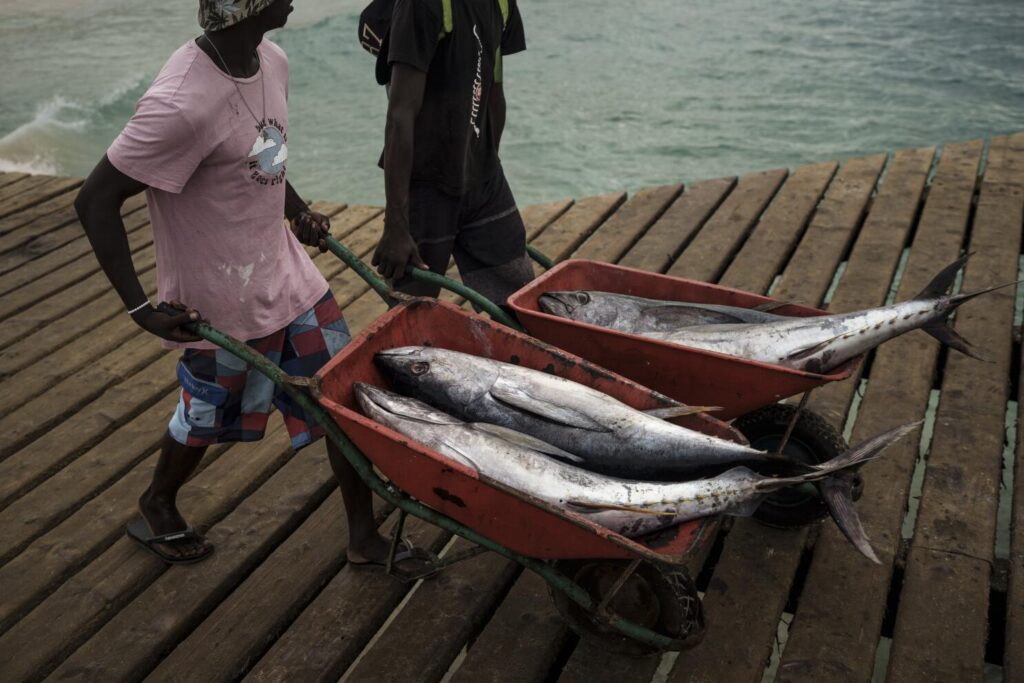
Fishermen carry tuna in Santa Maria, island of Sal, Cape Verde, Friday, Aug. 25, 2023. This year’s marine heat waves and spiking ocean temperatures foretell big changes in the future for some of the largest fish in the sea, such as sharks, tunas and swordfish. (AP Photo/Felipe Dana)
This year’s marine heat waves and spiking ocean temperatures foretell big changes in the future for some of the largest fish in the sea, such as sharks, tunas and swordfish.
The rising temperatures of the oceans are especially dangerous for these fish because warming makes their open-water habitats less suitable, scientists who study the species said. Loss of habitat could largely remove some of the most important predators — and some of the most commercially important seafood species — from the ocean.
One recent study, from Woods Hole Oceanographic Institution in Massachusetts, predicts that some large species could lose 70% of their habitat by 2100. It’s a sign that this year’s high temperatures aren’t an anomaly but a warning about what the ocean’s future could hold with climate change.
Species of large fish such as marlin and skipjack live in areas that are among the fastest warming ocean regions, projected to increase by up to 10 degrees Fahrenheit (6 degrees Celsius) by the end of the century, said Camrin Braun, a marine scientist and an author of the Woods Hole study. That much warming would prompt widespread redistribution of the animals, potentially fundamentally changing sea ecosystems, Braun said.
“Across the board, with life histories so different, we see this consistent signal of loss of habitat,” Braun said. “For sure, their habitat will change. How they respond to that is an open question.”
Temperatures the world over were hotter than any time in recorded history in July. Some scientists have placed the blame for the warm year at sea on this year’s El Nino climate pattern on top of human-induced climate change.
For large species of fish, the protracted warming can be disruptive because of their own thermal preferences, said Janet Duffy-Anderson, chief scientific officer of the Gulf of Maine Research Institute in Portland, Maine. Large fish are often highly migratory, and increased warming could result in the species moving to northern or deeper waters in search of more ideal temperatures, she said.
The Gulf of Maine, located off New England and Canada, is warming especially quickly.
“I think what we’ll see is a shift in their distribution,” Duffy-Anderson said. “We will see a shift in distribution of marlin species, tuna.”
Large fish are important to healthy oceans because many of them, such as white sharks, are apex predators and serve as vital pieces of the top of the food chain. But some are also economically important to humans as food.
The U.S. catch of swordfish was worth about $23 million at the docks in 2022 and many millions more at supermarkets, restaurants and seafood counters. Albacore tuna fetched more than $36 million at the docks.
Changes in distribution of large fish could necessitate major adaptations in the way fishing industries are regulated, said Braun, an assistant scientist at Woods Hole. The coming warming is “likely to have substantial socioeconomic impacts on fishing fleets that target” these fish, especially in the southeastern U.S., home of lucrative fisheries for species such as bluefin tuna and swordfish, his study said.
Fishing vessels will also need to adapt their strategies by fishing in different places or at different times of the year, said Tobey Curtis, a fishery management specialist with the National Oceanic and Atmospheric Administration who worked on the Woods Hole study. Climate models used for the study can help project the magnitude of the changes and plan for them, Curtis said.
The impact of warming waters on fish is complex, and the subject of much scientific research. A study in the scientific journal Nature in August found marine heat waves “are not a dominant driver of change” in some species that live near the ocean bottom. The study shows that negative impacts of marine heat waves can be unpredictable, its authors said.
Leadership and thoughtful management will be needed to navigate the changes in fish distribution without catastrophic results, said Gib Brogan, a campaign manager for the conservation group Oceana. Fish populations are dependent on healthy habitat, and loss of suitable habitat could lead to loss of species altogether, he said.
“If we don’t recognize that this is coming, that is going to lead to bad outcomes across the board,” Brogan said. “This is a wake up call for fishery managers or both sides of the Atlantic that … we need to change the way these fisheries are managed so we can be adaptive and proactive and preserve the fish stocks as they are changing.”
The potential loss of large fish is one of many consequences of warming oceans that scientists have sounded the alarm about this year. One scientific study said the collapse of ocean currents that transport heat northward across the North Atlantic could happen by mid-century. In Florida, ocean researchers with the federal government said coral reefs were losing their color weeks earlier than normal because of record temperatures.







